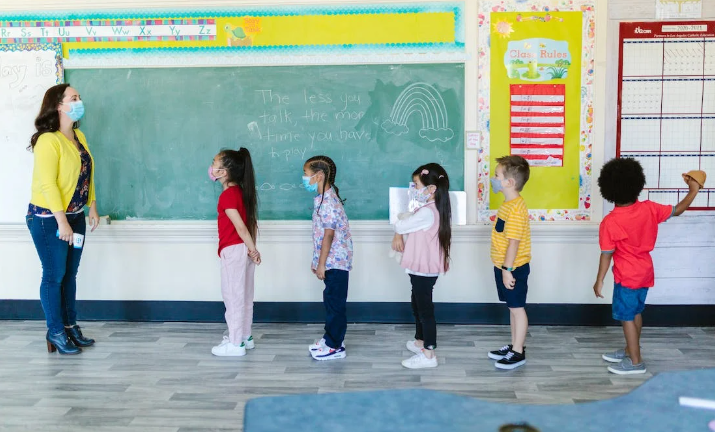What is the Role of Discipline in Education?: Discipline in education is a concept often discussed, sometimes debated, yet universally acknowledged as crucial for effective learning environments. It transcends the mere enforcement of rules and regulations; discipline instills habits, fosters responsibility, and cultivates a mindset conducive to learning and personal growth. In this comprehensive article, we have discussed the multidimensional role of discipline in education, examining its impact on learning at both school and higher education levels through examples and success stories.

Understanding the Role of Discipline in Education
Before delving into its impact, it’s essential to grasp what discipline entails in the realm of education. Discipline encompasses a spectrum of behaviors, ranging from punctuality and respect for authority to self-control and diligence in academic pursuits. It’s not about stifling creativity or enforcing conformity but rather about providing a structured framework within which students can thrive academically, socially, and emotionally.
Importance of Discipline in Homes and Learning Institutions
Discipline significantly influences the learning journey by fostering a stress-free environment that helps learners allocate time efficiently among different tasks. It also promotes better planning by encouraging the maintenance of a structured daily routine. Discipline contributes to the formation of a learner’s character and boosts their motivation, allowing them to set positive examples and excel in their academic endeavors. When analyzing academic performance, factors such as test anxiety, environment, motivation, and emotions must be taken into account. Multiple studies have highlighted a direct correlation between learners’ discipline and their academic achievements, with performance levels increasing in tandem with higher levels of discipline.
While educational institutions bear the responsibility of enforcing rules and codes of conduct, parents play an equally important role in ensuring consistency. Fundamental aspects such as dress code, hairstyles, and basic manners are instilled at home. Parents and educators, particularly school administrators, are pivotal figures in shaping the character of learners. Without addressing discipline from a young age, providing a high-quality education with maximum learner impact will be challenging. Therefore, if learners exhibit discipline at all levels, they are more likely to acquire knowledge and skills effortlessly, as they are focused and self-motivated.
Importance of Discipline in School
The importance of instilling discipline in schools cannot be overstated. Discipline is not merely a moral virtue; it is an indispensable trait that is essential for success in life. It is the driving force that propels individuals towards their goals and ambitions. Discipline is a skill that is cultivated over time and is best learned in childhood. Schools, therefore, play a crucial role in nurturing discipline and shaping well-rounded individuals.
Discipline is the cornerstone of a balanced life, aligning our body, mind, and soul in a proper order. A disciplined person approaches every task with precision and determination, thereby achieving personal and professional excellence. It is the foundation of stability in life, ensuring that every action is carried out efficiently and effectively. Therefore, discipline must be ingrained in every aspect of life to achieve true success.
Impact of Discipline in School Education
In the context of school education, discipline plays a pivotal role in shaping students’ academic performance, behavior, and overall development. Let’s discuss some of the roles of discipline in education of school going children with examples and success stories illustrating its impact:
1. Improved Academic Performance in Students
Schools with a strong emphasis on discipline often witness higher academic achievements among their students. For instance, consider the case of Smith High School, where the implementation of a structured disciplinary system resulted in a significant increase in graduation rates and standardized test scores. By fostering an environment where students are held accountable for their actions and encouraged to prioritize their studies, the school saw a tangible improvement in academic outcomes.
2. Character Development in School Going Students
Discipline goes beyond academics; it molds students’ character and prepares them for success in life. Take the story of Sarah, a student at Maple Grove Elementary School. Through consistent reinforcement of positive behaviors and clear consequences for misbehavior, Sarah learned the value of responsibility, respect, and perseverance. These character traits not only contributed to her academic success but also equipped her with essential life skills that would serve her well beyond the classroom.
3. Creating Safe and Inclusive Spaces
Discipline plays a crucial role in creating a safe and inclusive learning environment where all students feel valued and respected. At Oakwood Middle School, proactive measures were taken to address instances of bullying and disruptive behavior through a combination of disciplinary action and restorative practices. As a result, students reported feeling safer at school, leading to improved attendance rates and a more positive school climate.
4. Preparation for Future Success
The role of discipline in education lays the foundation for future success by instilling habits of self-discipline and perseverance. Consider the case of Michael, a high school graduate from a disadvantaged background. Despite facing numerous challenges outside of school, Michael credited his success to the discipline instilled in him by his teachers and mentors. Through their guidance and support, he developed the resilience and determination needed to overcome obstacles and pursue higher education.
Impact of Discipline in Higher Education
Moving into higher education, discipline continues to play a vital role in shaping students’ academic pursuits, professional development, and personal growth. Here are some roles of discipline in higher education given by highlighting its impact:
1. Role of Discipline in Academic Excellence
In colleges and universities, discipline is essential for academic success, particularly in rigorous programs such as medicine or engineering. Students like Emily, studying pre-med at a prestigious university, attribute their high grades and accomplishments to disciplined study habits, time management skills, and a commitment to excellence. By prioritizing their academic responsibilities and staying focused on their goals, students like Emily are able to excel in demanding academic environments.
2. Role of Discipline in Research and Innovation
Discipline in higher education extends beyond the classroom and into research and innovation. Consider the case of Dr. Patel, a renowned scientist whose groundbreaking discoveries in the field of renewable energy have earned international recognition. Dr. Patel’s success can be attributed not only to his intellect and expertise but also to his disciplined approach to research. Through years of dedicated study, experimentation, and collaboration, he was able to push the boundaries of scientific knowledge and make significant contributions to his field.
3. Role of Discipline in Professionalism and Ethical Conduct
Discipline is also essential for cultivating professionalism and ethical conduct among future professionals. In law schools, for example, students undergo rigorous training in legal ethics and professional responsibility to prepare them for the ethical challenges they may face in their careers. By upholding high standards of conduct and integrity, graduates are equipped to navigate complex legal dilemmas and uphold the principles of justice and fairness in their practice.
4. Role of Discipline in Lifelong Learning and Continued Growth
Finally, discipline in higher education instills a mindset of lifelong learning and continued growth. Whether pursuing advanced degrees, professional certifications, or personal interests, disciplined individuals like Professor Davis, who continues to publish research and mentor students well into retirement, demonstrate the value of intellectual curiosity and self-discipline. By embracing opportunities for learning and self-improvement, they not only stay abreast of new developments in their field but also inspire others to do the same.
Conclusion
In conclusion, discipline plays a fundamental role in education at both the school and higher education levels, shaping students’ academic performance, behavior, and character. From improving academic outcomes and fostering a safe and inclusive learning environment to preparing students for future success and promoting lifelong learning, the impact of discipline cannot be overstated. By recognizing its importance and investing in effective disciplinary practices, educators can empower students to reach their full potential and succeed in an increasingly complex and competitive world.
Also read important article: Unlock Your Career Potential: 11 Proven Strategies for Professional Success
FAQs on Role of Discipline in Education
Q. What is the role of discipline?
Ans. The role of discipline is multifaceted, encompassing the ability to create a structured environment, develop self-control, promote consistency, and drive individuals towards their goals, ultimately shaping them into responsible and successful individuals.
Q. How discipline impacts the learning process?
Ans. Discipline greatly influences the learning process by fostering a structured and stress-free environment, enabling efficient time management, improving planning through routine, shaping character, enhancing motivation, setting positive examples, and contributing to academic success.
Q. What is meant by discipline in education?”
Ans. Discipline in education refers to adherence to rules and codes of conduct, self-control, and a structured approach to learning. It involves creating an environment conducive to learning, instilling good habits, and fostering responsibility in students.
Q. What are the benefits of discipline in learning?
Ans. Discipline in learning leads to a focused approach, better time management, improved academic performance, enhanced self-control, and the development of responsibility. It creates a conducive environment for learning and fosters personal and academic growth.
Q. What is the role of discipline in education?
Ans. Discipline in education ensures adherence to rules and codes of conduct, fostering a structured learning environment. It also promotes self-control, time management, personal responsibility, and a positive attitude toward learning, ultimately enhancing academic success and personal development.
Q. What role discipline plays in career?
Ans. Discipline plays a critical role in career success. It helps individuals stay focused, manage their time effectively, develop self-control, and maintain consistency in their work. Discipline also cultivates good habits, professionalism, and reliability, contributing to overall success and advancement in one’s career.
Q. Why discipline has great importance in students life?
Ans. Discipline is essential in a student’s life as it cultivates a sense of responsibility, self-control, and respect for rules. It promotes good study habits, time management skills, and helps students maintain focus on their academic goals, leading to better academic performance and overall success in life.
Q. How discipline changes your life?
Ans. Discipline transforms one’s life by instilling structure, organization, and self-control. It encourages consistent effort towards goals, fosters responsibility, and improves decision-making, ultimately leading to greater personal growth, achievement, and success.

